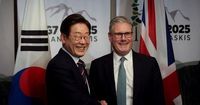British Prime Minister Keir Starmer found himself at the center of an awkward diplomatic moment at the G7 summit held in Canada on June 19, 2025. In a surprising mix-up, Starmer mistakenly shook hands with the interpreter of South Korean President Lee Jae-myung, confusing him for the newly inaugurated leader. This blunder occurred during an official meeting with the South Korean delegation, sparking a moment of embarrassment for all parties involved.
Lee Jae-myung officially took office as South Korea's president on June 4, 2025, following snap elections that were called after the impeachment of former President Yoon Suk-yeol. Yoon was removed from office due to an attempted coup, a rare and serious political upheaval in South Korea’s recent history. Lee's rise to power was therefore not only significant domestically but also closely watched internationally.
At the G7 summit, which brings together the world's major advanced economies, the meeting with the South Korean delegation was a key moment for Starmer, who was aiming to solidify the United Kingdom's international partnerships. However, the handshake gaffe immediately drew attention. Instead of greeting President Lee, Starmer extended his hand to the interpreter, who was standing close by. The interpreter, caught off guard, accepted the handshake, while the real president looked on.
Adding to the awkwardness, during the subsequent joint photo session, Starmer seemed unsure where to position himself. This hesitation caused a pause and some discomfort among the delegations, as the British prime minister took a moment too long to find his place for the official photographs. The South Korean side appeared particularly unsettled by the delay.
Despite the initial embarrassment, Starmer quickly moved to smooth over the situation. He emphasized the strong and positive relationship between the United Kingdom and South Korea, stating that Britain was committed to strengthening ties, especially in trade and defense sectors. This sentiment was echoed by President Lee Jae-myung, who expressed support for updating and enhancing the trade agreement between the two countries.
Such diplomatic missteps are not entirely unprecedented on the global stage. For instance, last autumn at the BRICS summit, Russian President Vladimir Putin experienced his own moment of public embarrassment when he struggled to correctly pronounce the name of Turkish President Recep Tayyip Erdoğan, failing on multiple attempts. These incidents highlight the challenges and pressures world leaders face in high-profile international settings.
Starmer’s mix-up, while awkward, did not derail the broader goals of the summit or the bilateral discussions between the UK and South Korea. The meeting underscored the importance both nations place on deepening economic and defense cooperation amidst a complex global landscape. With trade agreements and security partnerships on the agenda, both leaders appeared eager to move past the initial faux pas and focus on substantive collaboration.
South Korea’s recent political turbulence adds another layer of significance to these diplomatic engagements. The removal of Yoon Suk-yeol for an attempted coup was an extraordinary event that shook the nation and drew international attention. Lee Jae-myung’s swift election and assumption of office signal a new chapter for South Korea, one that the global community, including the UK, is watching closely.
As the G7 summit continues to serve as a platform for dialogue among leading economies, moments like Starmer’s handshake error remind us that even seasoned politicians can face human errors amidst the high stakes of diplomacy. Yet, these incidents also provide opportunities for leaders to demonstrate grace and reaffirm commitments to partnership and cooperation.
In the end, the handshake mishap became a footnote to the larger narrative of strengthening UK-South Korea relations. Both leaders left the summit with a shared understanding of the importance of their alliance, particularly in trade and defense, areas critical to their national interests and regional stability.
Keir Starmer’s experience at the G7 summit serves as a reminder that diplomacy, while often formal and scripted, is still very much a human endeavor, subject to the occasional slip-up but always with room for recovery and progress.

